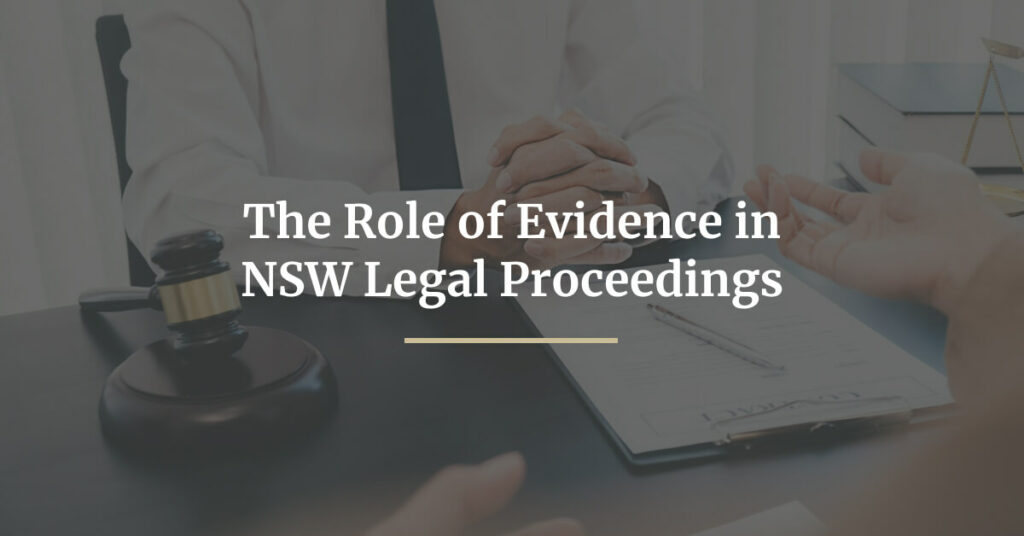The Role of Evidence in NSW Legal Proceedings
Navigating through the legal pathways of New South Wales (NSW), one encounters the crucial impact evidence has in sculpting the outcomes of legal proceedings. The canvas upon which legal proceedings are painted is richly detailed with various forms of evidence, each meticulously scrutinised and presented to prove a case paving the way towards justice. This discussion, presented by Empower Wills and Estate Lawyers, unfolds the nuanced roles, challenges, and impacts of evidence within NSW’s legal terrains, offering insights into its multifaceted nature and enduring influence on judicial proceedings.
Understanding Evidence in Legal Context
In the realm of NSW legal proceedings, evidence stands as the bedrock upon which cases are won or lost and upon which judgments are made. Evidence, in a legal lens, refers to the information presented to a court to prove a case. Diverse in its forms, evidence in NSW can be delineated into:
- Documentary Evidence: Encompasses physical or electronic documents relied upon to substantiate or refute claims, such as contracts, wills, communications, or records.
- Witness Testimony: Involves written or oral statements provided by individuals privy to relevant information concerning the case, including eyewitness accounts.
- Expert Evidence: Involves opinion evidence from a person who possesses the requisite skill, knowledge and experience upon which to give the opinion.
- Digital Evidence: Entails electronic data, including emails, text messages, and social media interactions, that can prove or disprove claims.
The Admissibility of Evidence
Evidence serves as the linchpin around which the wheels of justice revolve, but not all evidence is treated equally in the eyes of NSW law. The principle governing the admissibility of evidence pivots on two key criteria:
- Relevance: Evidence must have a direct bearing on the matters being adjudicated, serving to either substantiate or refute the claims being made.
- Reliability: The credibility of the evidence and its source are scrutinised to ensure it provides a trustworthy basis upon which to form judgments.
Certain evidence might be excluded due to various reasons, such as:
- Prejudicial Evidence: Where the evidence might unfairly sway the court or jury against one party despite its relevance.
- Hearsay: Statements made by a person who is not available to give evidence are generally inadmissible unless they fall under certain exceptions.
- Illegally Obtained Evidence: In certain scenarios, evidence obtained unlawfully may be excluded, maintaining the integrity of the justice process.
This framework ensures that evidence utilised in court is both pertinent and reliable, upholding the fairness and credibility of the legal proceedings within NSW.
Gathering and Presenting Evidence
The intricate process of amassing and presenting evidence in NSW courts is guided by stringent protocols and procedures, ensuring both legitimacy and fairness:
- Gathering: Evidence is meticulously collected by involved parties, often involving investigative processes, expert analyses, and witness interviews.
- Preservation: Ensuring evidence remains unaltered and its integrity maintained is paramount, safeguarding its authenticity and admissibility.
- Presentation: In court, evidence must be presented in a manner that adheres to procedural guidelines, ensuring clear, coherent, and unbiased delivery to the adjudicating body.
However, practitioners often navigate through a sea of challenges in dealing with evidence, including:
- Accessibility and Availability: Ensuring evidence can be accessed and utilised.
- Validity and Reliability Concerns: Ensuring that evidence is authentic and credible, avoiding potential pitfalls of forgeries or misinformation.
- Ethical Dilemmas: Ensuring that the gathering and use of evidence align with moral and legal standards, upholding the sanctity of the legal process.
Evidence and Its Impact
The instrumental role of evidence in NSW legal proceedings is not merely confined to validating facts but extends into influencing case dynamics, legal strategies, and, eventually, the dispensation of justice. Its impact is multifaceted and can often reverberate through the entirety of a case:
- Directing Legal Proceedings: The availability, quality, and admissibility of evidence often steer the course of legal proceedings, guiding how cases are argued, defended, and adjudicated.
- Influencing Judicial Decisions: Judges and juries, in their pursuit of fairness and justice, heavily weigh the presented evidence, with its credibility, relevance, and potency influencing verdicts and rulings.
- Affecting Sentencing: Particularly in criminal cases, the nature and strength of evidence can impact sentencing, determining the severity and nature of penalties imposed.
- Upholding Justice: Perhaps most vitally, evidence underpins the realisation of justice, ensuring claims are substantiated, rights defended, and fairness upheld within legal deliberations.
The profound impact of evidence on these facets underscores its vitality and indispensability within the legal landscape, driving home the imperative of meticulous, ethical, and judicious use of evidence in the NSW legal system.
Conclusion
The role of evidence within NSW legal proceedings unfurls as a complex yet paramount entity, intricately weaving through the realms of case building, trial navigation, and justice delivery. From understanding its multifaceted forms to navigating through the meticulous processes of gathering, preserving, and presenting, the evidence stands as a steadfast pillar supporting the edifice of justice. Its impact, both subtle and pronounced, permeates through case strategies, legal outcomes, and, ultimately, the justice delivered. As we reflect upon the various vignettes and nuances explored, the criticality of evidence, in all its forms and stages, emerges undisputedly as an essential protagonist within the legal narratives crafted within the courtrooms of NSW.
Disclaimer: the information in this article relates to NSW law as at the date it was written and is general information only. It does not constitute legal advice and should not be relied upon as legal advice. It may contain information or links to sources which are no longer current. If you have a question or legal issue we recommend you contact a lawyer and obtain legal advice that takes into account your specific facts, circumstances, needs and objectives.

